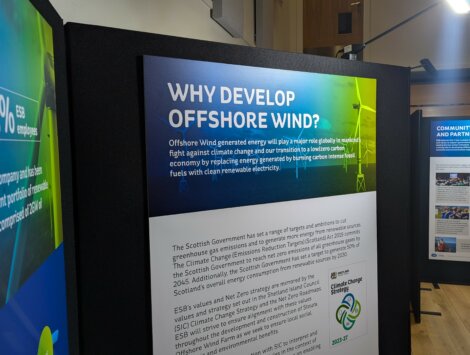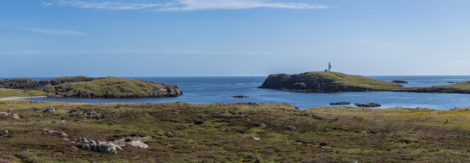Energy / Stoura offshore wind developer commits to community benefit – but fishing concerns remain
THE DEVELOPER of one of two offshore wind farms proposed to the east of Shetland says it is committed to a community benefit fund scheme.
However ESB’s project director Dr Cian Desmond said it remains unclear at this stage how this may work.
He was speaking as the Irish energy firm held a public consultation event at the Shetland museum on Thursday about its proposed 500MW Stoura offshore wind farm, which would be located around 40 kilometres east of Skerries.
It could be another ten years before the turbines – potentially 28 – are actually installed and generating electricity.
A timeline for the Stoura wind farm shows a planning application could be submitted in late 2027 or 2028.
Dr Desmond said in the meantime the company will continue to work to understand the constraints around offshore wind development while engaging with stakeholders such as the council, Marine Scotland the fisheries sector.
Stoura is one of two offshore wind farms proposed to the east of Shetland which have secured rights from Crown Estate Scotland.
The other is the much larger 2.3GW Arven project, led by Ocean Winds and Mainstream Renewable Power.
With the idea of community benefit a hot topic following the recent switch-on of the 103-turbine onshore Viking Energy wind farm, Dr Desmond confirmed there would be some sort of fund from the ESB development.
“But what the magnitude of that is going to be I don’t know,” he told Shetland News.
“Because we don’t know how much our wind farm is going to cost, we don’t know we’re going to finance it, we don’t know how we’re going to get paid for electricity.
Become a member of Shetland News
“At the moment there’s just a lot of uncertainty there for us.”
Dr Desmond said Shetland has “world class expertise” in the area – referring to the oil revenue taken in and distributed locally by Shetland Charitable Trust – and said ESB is keen to learn from how things have worked in the isles before.
Under energy development principles approved in 2022, Shetland Islands Council believes £5,000 per installed megawatt or around 2.5 per cent of generation value is appropriate for offshore wind community benefit.
This is similar to onshore wind, with Viking Energy wind farm developer SSE paying out £5,000 per megawatt for local projects – £2.2 million a year.
If the same was applied to Stoura the community fund could reach up to around £2.5 million a year.
The energy development principles also raise the idea of “energy contributions” as community benefit instead of cash.
A key concern from the local community remains the impact offshore wind projects could potentially have on the fishing industry, with a particularly worry over boats being squeezed out of their grounds.
Dr Desmond said fisheries is a “huge” thing for the developer as engagement with the sector continues.
He added that among the ESB team is someone with a fisheries background in Ireland, who is leading on engagement with the industry.
The project director said the team was also in Whalsay during the week to meet with folk involved in the pelagic fleet.
“We’re working closely with the fisheries organisations and it’s all about understanding what the impact is going to be of what we’re proposing,” he said.
Shetland Fishermen’s Association officials were at Thursday’s event, along with a number of fishermen.
Executive officer Daniel Lawson said it presented the team a chance to reiterate why fishermen are “very, very concerned” about offshore wind projects lined up to the east of Shetland.
He said the north half of the Stoura site is “prime” whitefish and pelagic fishing grounds and suggested locating the turbines in a different area.
But Lawson also raised “scientific worries” on the effect of electromagnetic cabling on shellfish stocks and fish larvae, and the impact anchoring floating turbines could have on spawning grounds.
The cable route to mainland Shetland could also be a cause for concern for fishermen, Lawson suggested.
Dr Desmond said it is too early to say where cabling could land in Shetland, with talks ongoing with SSE.
An onshore substation is also planned, as well as one offshore too.
But Lawson raised concern over offshore wind’s links to future hydrogen production in Shetland, and how this could potentially affect scallop grounds.
“These projects are all speaking about making hydrogen with their power and the base for that seems to be forming around Sullom Voe and Scatsta, which means if you’re bringing a cable ashore you want to bring it through Yell Sound,” he said.
If this was the case, Lawson said cabling would have run through scallop grounds, which are already “so constrained” by aquaculture developments and increased marine protection.
With scallop fishermen only operating in around eight per cent of Shetland waters, “they’re understandably very protective of the grounds they have left”, Lawson said.
In terms of the cable route, Dr Desmond said “it’s about mapping out all those constraints” – such as aquaculture, scallop grounds, inshore fisheries and some wrecks too.
He said the “big driver” for where cables reach land will be the “location of the HVDC connection point we’re going to be offered”.
Dr Desmond added that one of the next stages for the project is a scoping report, which will give more information about the development and any impacts, which will go out for consultation.
After that there will be another public exhibition prior to ESB submitting its planning application.
Become a member of Shetland News
Shetland News is asking its many readers to consider paying for membership to get additional features and services: -
- Remove non-local ads;
- Bookmark posts to read later;
- Exclusive curated weekly newsletter;
- Hide membership messages;
- Comments open for discussion.
If you appreciate what we do and feel strongly about impartial local journalism, then please become a member of Shetland News by either making a single payment, or setting up a monthly, quarterly or yearly subscription.



































































